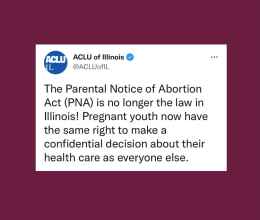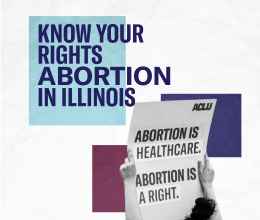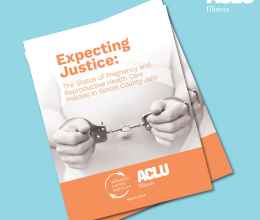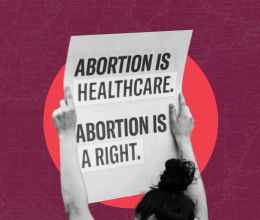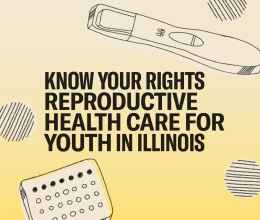
 Last week, the ACLU of Illinois asked a state court to block enforcement of Illinois' Parental Notice of Abortion Act. We presented extensive and compelling evidence that the newly-effective law puts Illinois teens at significant risk for serious and irreversible harm. Purportedly seeking to promote family communication, the law ignores some basic realities: first, most minors already involve their parents in their abortion decision; second, where they cannot, it is for good reason.
Last week, the ACLU of Illinois asked a state court to block enforcement of Illinois' Parental Notice of Abortion Act. We presented extensive and compelling evidence that the newly-effective law puts Illinois teens at significant risk for serious and irreversible harm. Purportedly seeking to promote family communication, the law ignores some basic realities: first, most minors already involve their parents in their abortion decision; second, where they cannot, it is for good reason.
The newly effective law fails to account for the fact that some families in our state live with violence and abuse and that forced notification regarding pregnancy and abortion will prompt an escalation in such violence, lead to new cases of abuse or neglect, and in many cases force young women to continue pregnancies they do not want in the face of increased medical risk and significant consequences for their lives.
The state simply cannot justify the imposition of such harm when it permits pregnant minors to make ALL other medical decisions without involving a parent--decisions that are far riskier from a medical perspective, such as having a cesarean section or taking medication for preexisting conditions that can affect the health of their pregnancy. The law singles out only those pregnant minors who decide to terminate their pregnancy for the special requirement that they involve a parent or ask a judge for permission not to.
The ACLU's suit demonstrates that this law is unnecessary and harmful and as such violates the protections afforded under the Illinois Constitution which are more expansive than those provided under federal law. The young women's stories included in the evidence submitted to the court are heart-wrenching:
One young woman described how her parents responded when her older sister became pregnant. Upon learning of the pregnancy, the father beat the older sister and threw her out of the house with all of her belongings. He then ordered the younger siblings to take the discarded things to a dumpster and demanded that they never to speak to their sister again. With this experience fresh in her mind, the young woman knew she could not reveal her own unintended pregnancy to her parents.
Other young women have been emotionally abused or beaten when their parents learn they are pregnant; some involuntarily sent to live in another country to prevent them from having an abortion; and others forced to give birth and parent against their will. One young woman who wanted to continue her pregnancy was abandoned by her mother at an abortion clinic when she refused to agree to have an abortion.
Proponents of parental notice laws acknowledge, as they must, that these kinds of situations exist but claim that the alternative of judicial bypass is the answer. The judicial bypass process requires a minor to go to court and ask for a judge's permission to have the abortion without notifying a parent.
Unfortunately, the judicial bypass process creates its own harms and places additional obstacles for young women trying to get to court to seek such judicial permission. Even the most well-run bypass process creates additional risk of breach of confidentiality and imposes medically risky delay; indeed, for some young women, it puts abortion completely out of reach.
Minors have to arrange for time away from school and home to go to court - an enormous challenge when they must do so without raising suspicion. Once at the courthouse, they risk being identified and having their circumstances revealed. One teen was at the courthouse for a bypass hearing when her sister's class came through on a field trip. Another ran into her father outside the courthouse. One young woman successfully went through her bypass hearing; days later, an anti-choice group sent her parents a letter informing them that she had done so. They had monitored the courthouse and identified her from a school yearbook picture.
The very real threat of being recognized causes many young women to avoid going to court altogether. Moreover, the bypass hearings themselves take a significant emotional toll. Young women must tell the most intimate details of their lives to a judge - a complete stranger - who wields absolute authority over this life altering decision. The fear of doing so is particularly overwhelming for teens who seek a bypass because of the threat of abuse who will simply be unable to reveal their tragic home circumstances because of fear or shame.
In face of these very real harms, it is clear that the bypass serves no purpose. In the 20,000 bypass hearings conducted in Massachusetts since 1981, only 2 requests have been denied, and nearly all of those granted were granted because the young women were mature enough to make this decision without involving their parents. Similarly, a Minnesota judge who hears bypass requests testified that he has denied only 1 request out of more than 600, and in that case the young woman - seeking of waiver of her obligation under the Minnesota law to notify her long-estranged father - came to court with her mother.
Young women are mature enough to make this decision on their own. Unfortunately, faced with mandated parental involvement laws, some young women are so desperate to avoid telling their parents or going to court that they try to end their pregnancies in other ways: one young woman threw herself down a flight of stairs in hopes of ending the pregnancy and another started a fight with her brother in the hope that he would hit her in the stomach and cause a miscarriage. There is also the well-publicized case of Becky Bell from Indiana who had an illegal abortion and died from complications.
Because of the unwarranted harms of mandatory parental involvement laws, leading medical organizations - including the American Medical Association, the American Academy of Pediatrics, the American College of Obstetricians and Gynecologists, the Society for Adolescent Medicine and the American Public Health Association - oppose the measures strongly and publicly. These organizations, while encouraging voluntary family communication, recognize the harms caused by these laws and are clear that they are simply unjustified.
The Illinois law is unwarranted and indeed dangerous and simply cannot survive scrutiny under the Illinois State Constitution, which grants broader protections than the U.S. Constitution. For this reason, we have asked the state court to strike down this law.
